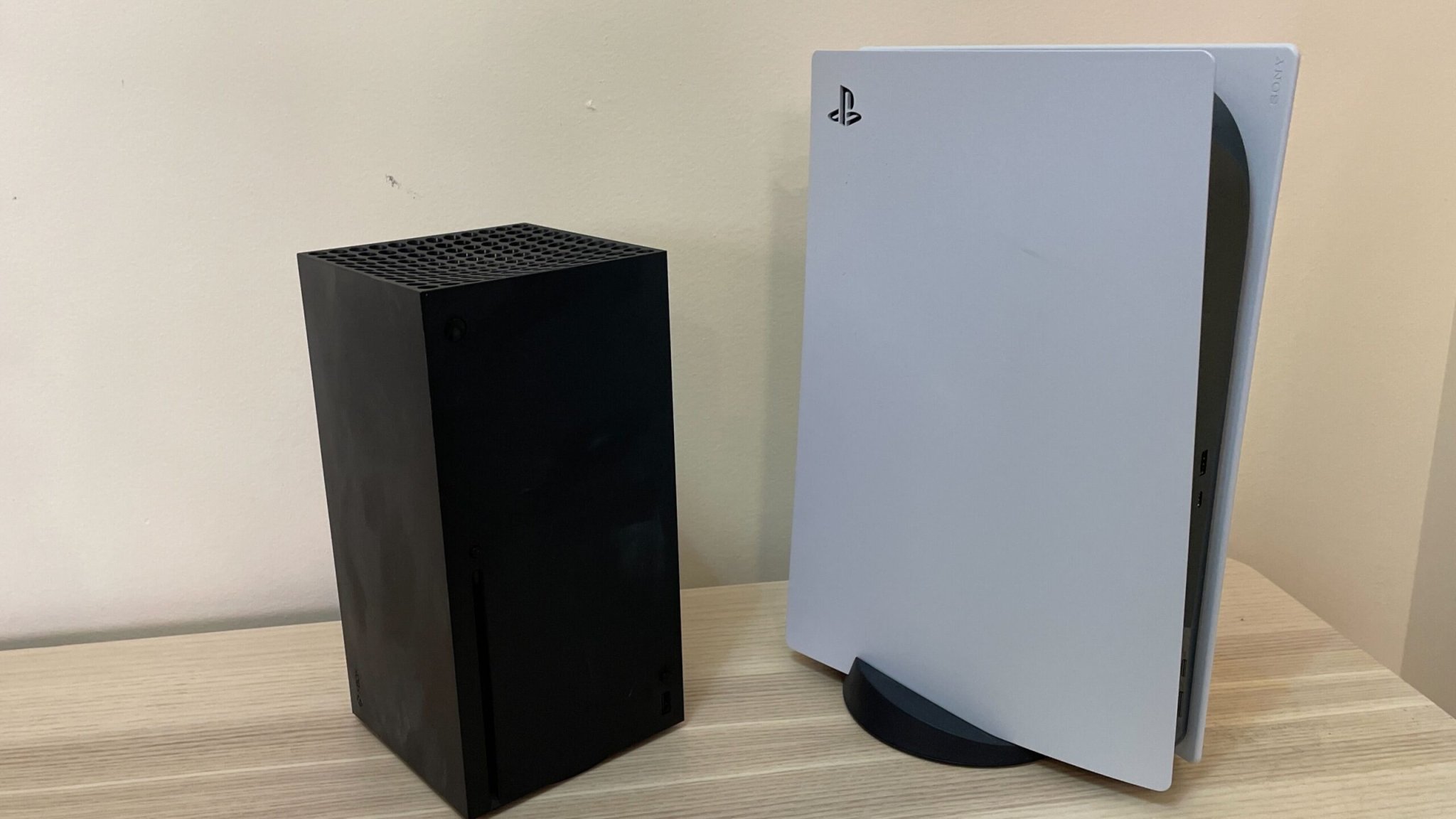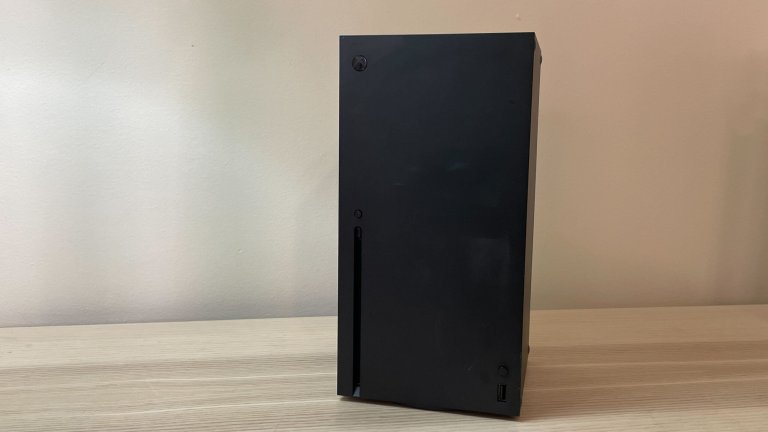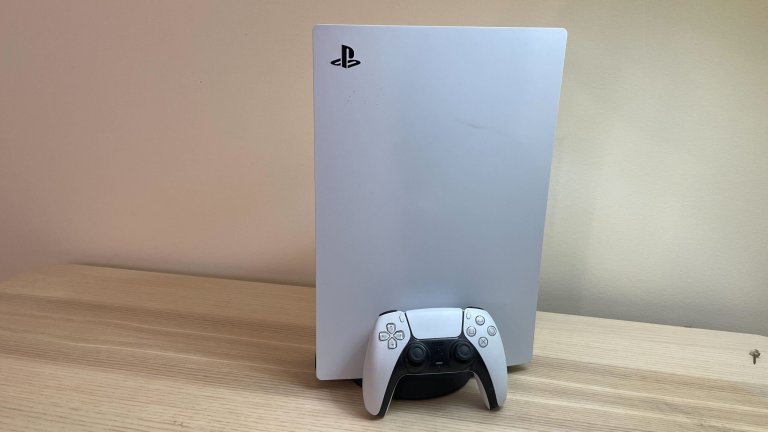

We may earn revenue from the products available on this page and participate in affiliate programs. Learn more ›
The PlayStation 5 and Xbox Series X launched in November 2020. That may sound old in the gadget world, but it will likely be several more years before these machines reach their full potential. Due to supply chain issues and a host of global complications, these devices haven’t always been easy to buy: you couldn’t simply waltz into a store after release and walk out with one tucked under your arm. Supply has improved dramatically of late, but, with a string of awesome exclusive games tied to each and a selection of promising new features that immerse you deeper in the gaming experience, it’s worth digging into the details to discover which next-gen console is right for you.
Xbox Series X vs PS5: Welcome to the ninth generation of video game consoles
As graphics technology edges closer and closer to uncanny realism, competition within each video game console generation is hotter than ever. It can feel like splitting hairs, but there are some key differences in approach between the PS5 and Xbox Series X that we’re going to identify to help you make an informed purchasing decision.
Xbox Series X
Tower of Power
See ItSpecs
- Price: $499
- Memory: 16 GB
- Storage: 1TB SSD
- Storage expansion: Seagate SSD expansion cards (512GB-2TB)
- GPU power: 12.14 Teraflops
- CPU speed: 3.8 GHz (3.6 GHz with SMT)
- Dimensions: 5.94 x 11.85 x 5.94 inches
- Weight: 9.8 lbs
- Ports: 3 x USB type-A, HDMI 2.1, Ethernet
The Xbox Series X is Microsoft’s latest effort and the most powerful next-gen console on the market, with a whopping 12 teraflops of raw power. It’s capable of playing games in 4K at up to 120 frames per second, so you’ll be able to enjoy the detailed fidelity and fluid frame rate of beautiful exclusives like Halo Infinite and Forza Horizon 5. The reserved mini-fridge-shaped design of the Series X is a shift from previous generations but—great news—the console still looks very sleek and unassuming when it’s nestled in your TV stand.
Aside from better graphics and higher frame rate, the most obvious improvement of the Xbox Series X has to be faster load times. The console’s 1TB solid-state drive boots software and powers through loading screens almost instantly for many games. You can also make use of the Xbox operating system’s Quick Resume function, introduced with the Series X, which suspends save states for up to three Xbox Series X games, and more for backward-compatible games. Quick Resume allows you to jump back in right where you left off, whether or not you saved your game.
But Xbox’s secret weapon this generation is Xbox Game Pass Ultimate. Microsoft’s game subscription service lets you access hundreds of games, including all of Microsoft’s first-party exclusives, for $10 to $15 per month (depending on your subscription renewal option). Xbox’s adoption of the service model helps to take the sting out of the old method of paying retail prices for multiple games every year, as long as you’re ok with adding another bill to your monthly expenses.
PlayStation 5
The Blockbuster Box
See ItSpecs
- Price: Digital Edition: $399 / Standard (with disc drive): $499
- Memory: 16 GB
- Storage: 825GB SSD
- Storage expansion: Select M.2 SSD
- GPU power: 10.28 Teraflops
- CPU speed: 3.5 GHz
- Dimensions: 15.4 x 10.24 x 4.09 inches
- Weight: 8.6 lbs
- Ports: 1 x USB type-C, 3 x USB type-A, HDMI 2.1, Ethernet
A highly coveted piece of tech, the PlayStation 5 is also a monumentally powerful game console. With 10 teraflops of GPU power, the console chews through graphically intensive exclusives like Returnal, Gran Turismo 7, and Horizon: Forbidden West. Like the Series X, the PS5’s SSD trivializes loading times, letting you fast-travel around open-world maps in seconds. With an 825GB storage drive, you’ll be able to download several chunky games before it gets full, with expandable storage available if you wish to grow your persistent library even further.
Sony has pulled focus onto immersion for this generation, a mantra delivered most acutely through the DualSense controller, with its remarkable vibration technology, tactile adaptive triggers, and built-in speaker. The PS5’s Tempest Engine delivers 3D Audio through TV speakers or any headset, which brings players closer to in-game soundscapes and environments.
In 2022, Sony made a big leap in catching up to Microsoft’s Game Pass Ultimate offering. PS Plus Premium costs $18 per month (or as low as $79 per year if you’re willing to pay annually). It grants access to online play, as well as a catalog of current games and a backlog of classic games from PlayStations of yore.
At $399 for the digital edition and $499 for the standard PS5 with a disc drive, consumers have options depending on the way that they consume games, without having to sacrifice any raw power. But perhaps the most divisive thing about the PS5 is its physical design. The console is anything but subtle, with its white over-extending plastic plates and griddle middle. Given how hard it’s been to find, I imagine there are plenty of people who don’t mind displaying it prominently, like an e-commerce trophy.
Xbox Series X vs. PS5: How do they stack up?

Xbox and PlayStation have locked horns for decades and the competition remains fierce in this console generation. To help you see past the hype, we’re going to hone in on some major areas where the two titans differ, so you know what console to buy.
Understanding the differences between each console’s design and technical performance is important, but the content is the most important dynamic in the current gaming landscape. The Xbox Series X and the PS5 differ in their approach to services and software, with gulfs in quality and quantity on either side.
Are you looking for a Criterion Collection of excellent exclusives or just a huge library of good games to play on your new console? Do things like backward compatibility or virtual reality matter to you? And, crucially, how much is this all going to cost? Let’s see what they have to offer.
Parts and performance
The Xbox Series X and the PS5 are closer in power and performance than they look on paper. Sure, the Series X is technically more powerful but the bumps in frame rate and fidelity feel relatively minor in many games. You probably aren’t going to notice a graphical difference between the two in most games. They’re both capable of running games in 4K resolution at up to 120 frames per second. (Both Sony and Microsoft say the consoles are capable of 8K in theory, but the option isn’t available now without an asterisk.) Neither one will make you regret pairing it with one of the best gaming TVs on the market. Both machines’ performance, ultimately, comes down to how developers use the consoles to create software that makes the most of their parts.
Beyond the spec sheets, though, the Series X passes on some practical benefits from its extra power. For example, it can suspend multiple games using Quick Resume, so, for example, you can play and suspend Psychonauts 2, Assassin’s Creed Valhalla, and Elden Ring, then jump back into any of them where you left off. The PS5, meanwhile, can only suspend the game that you’re currently playing. As we mentioned, it doesn’t take long for the PS5’s SSD to boot up your game from scratch but you do need to be more mindful of saves and potential lost progress.
Storage

Usable storage is another factor to think about. The Xbox may have 1TB of storage, but you can only use around 802GB of it. The PS5 has 825GB of storage, but you can only use around 667GB of it. Storage expansion is really helpful for both consoles, so you could argue this comes out as a wash. On the other hand, that extra 135GB should translate to an extra two to three games (or Call of Duty: Vanguard).
The PS5 has less storage space but it makes up for it with its approach to upgradable internal memory. If you’re OK with opening up your PS5, you can purchase and slot one of several third-party M.2 SSD drives in there and expand your storage with relative ease. The Xbox Series X takes a different approach, with a proprietary, expensive Seagate expansion card that inserts into a dedicated slot in the back of the console.
Design and ports
These two consoles could not look any more different. The PS5 is space-age and alien, whereas the Xbox Series X is reserved and brutalist. The PS5’s size and wacky contours can be off-putting or inviting depending on your style, whereas the Xbox is hard to grumble at with its space-saving, sleek approach. The only difference between the ports is that the PS5 offers a USB-C input, which is some solid future-proofing and handy for fast-charging
Peripherals

Sony’s focus on immersion in this generation has birthed the DualSense, a USB-C PS5 controller that delivers convincing haptic vibrations, adaptive triggers, and internal audio that makes meaningful strides toward full gaming immersion by enhancing moment-to-moment gameplay features. Guns jamming will be reflected in the triggers, as will the tensile pull of a bow or a web in open-world games. You can feel raindrops and the pitter-patter of feet in your palms and the controller’s speaker will augment in-game audio. Given the technical plateau between the consoles, this is easily a big win for the PlayStation 5 when it comes to providing a next-gen feeling. (Sony’s Pulse 3D gaming headset is also purpose-tuned for the PS5’s 3D Audio and a spatial-in-game experience.)
The Xbox Series X controller is the same design seen in previous generations but that means it is also one of the most ubiquitous and accessible controllers on the market. The haptics are still solid, and this time around there’s a USB-C port, a share button, and some textured paneling, which is a nice touch. At the end of the day, both controllers feel great and are perfect for playing games, but if you care about fancy features and immersion, the DualSense is delightful.
Software and services
Any expert will tell you that, when it comes to picking a game console, content is king. Xbox and PlayStation share some common ground but do vary in approach when it comes to software and services.
Over the last generation, Sony has delivered a consistent catalog of critically acclaimed and forward-thinking exclusive games and franchises like Bloodborne, God of War, The Last of Us, Uncharted, Marvel’s Spider-Man, and more. Sony cultivated a strong reputation on PS4 and it’s hard to ignore the sheer quality of its output. In its short lifespan so far, Sony has already started to do the same on PS5 with games like Deathloop, Demon’s Souls, and Ratchet and Clank: Rift Apart. Hard to argue with how the console has delivered in the software department for early adopters, and there are coveted games in development from Sony’s crop of acquired first-party studios, such as God of War: Ragnarok and Star Wars Eclipse.

Xbox, meanwhile, struggled with game development for most of the Xbox One generation. However, Microsoft’s acquisitions of Bethesda, Activision Blizzard, and many other game developers have pushed things in the right direction. Microsoft now holds the keys to franchises like Call of Duty, The Elder Scrolls, Fallout, and more, with many exciting new games in development from its vault of acquired studios, which, under the Xbox Game Studios banner, dwarf the size of PlayStation Studios.
Recent exclusives like Halo Infinite and Forza Horizon 5 have also been critical success stories, which has helped Microsoft’s reputation considerably. To date, Microsoft has also championed backward compatibility over Sony and Nintendo, making the large swaths of the original Xbox and Xbox 360 playable natively, in addition to nearly the entire Xbox One library. Sony aims to close this gap with its upcoming PlayStation Plus Premium subscription, but its support is currently somewhat limited.
On the other hand, Sony has virtual reality, via its PlayStation VR headset. PlayStation VR 2 is on the horizon. Xbox has never released a VR headset or games.
Xbox Game Pass vs. PlayStation Plus
The next front of the “console war” between PlayStation and Xbox will be content subscriptions. Microsoft’s Xbox Game Pass Ultimate is a ridiculously good deal, offering a massive library of 450+ games to players for $14.99, including all of Xbox’s first-party and exclusive games on day one of their release. It’s worth noting that the subscription includes a separate Xbox Game Pass for PC library available on Windows, online multiplayer access, cloud gaming, monthly free games, and other discounts. It’s hard to grumble at Microsoft’s offering, especially if you aren’t keen on spending $60-$80 every time a game comes out.

Right now, Sony doesn’t have an equivalent service. Previously, it had two services that offered parts of the package: PlayStation Plus, which enabled online multiplayer and a monthly trio of games for $9.99 a month, and PlayStation Now, which offered limited streaming games on PS4 and PS5 for another $9.99.
Sony combined these services into a single, three-tiered PlayStation Plus subscription in June 2022. The first tier, PlayStation Plus Essential, is the same as the previous PlayStation Plus membership. The second, PlayStation Plus Extra, adds a catalog of up to 400 games to this deal for $14.99 a month. The top tier, PlayStation Plus Premium, goes further, adding 340 additional backward-compatible games from previous PlayStation generations for $17.99 a month, available via cloud streaming or digital download. Crucially, Sony has said that neither PlayStation Extra nor the PlayStation Premium subscriptions will include new exclusive games on release day.
Right now, there’s no question that Xbox Game Pass Ultimate is the superior subscription. It offers more games, a better value, and a pathway to playing the games you want. It’s hard to say whether the new PlayStation Plus will level the playing field, but Sony does have an advantage in its pipeline of amazing first-party exclusives. Sony said it will ardently try to preserve its level of quality as it slides into game streaming service territory, but is also adapting with the addition of a game library and backward compatibility in the future. The choice may come down to quality or quantity.
Price
The PlayStation 5 is the clear winner when it comes to value for money if you’re not bothered about having a disc drive. The digital edition of the PS5 (with no technical compromises) retails at $399, cutting $100 off of the flat retail price of the $499 Xbox Series X. When comparing the disc drive-based PS5 and the Xbox Series X, though, they’re in a dead heat.
The next step is to consider the Game Pass library versus Sony’s exclusives and the future of PlayStation Plus. Xbox Game Pass costs $15 per month, or $180 per year. PlayStation Plus Extra will cost the same monthly rate but only costs $100 per year if you pay annually. PlayStation Plus Premium will cost $17 per month, or $120 per year if you pay annually. That’s a significant saving, but it doesn’t factor in that you may wind up buying PlayStation exclusives if you want to play them when they come out.
There are many intangibles that we can’t predict for you when considering Xbox Series X versus PS5—how excited you’ll be for specific exclusives, how disciplined you are about waiting to buy games on sale, or how much money you might save by trading physical copies of games in when you’re done with them. And, of course, your budget.
Some final thoughts on the Xbox Series X vs. PS5

The PS5 and the Xbox Series X offer very similar technical specifications, so the choice is more about the lifestyles that Sony and Microsoft purport to offer through their latest consoles. If you want to prioritize a string of blockbuster single-player games, then you may want to consider the PlayStation 5. If you’re looking for accessibility, tons of games, and the most bang for your buck, then the Xbox Series X is the best choice.


